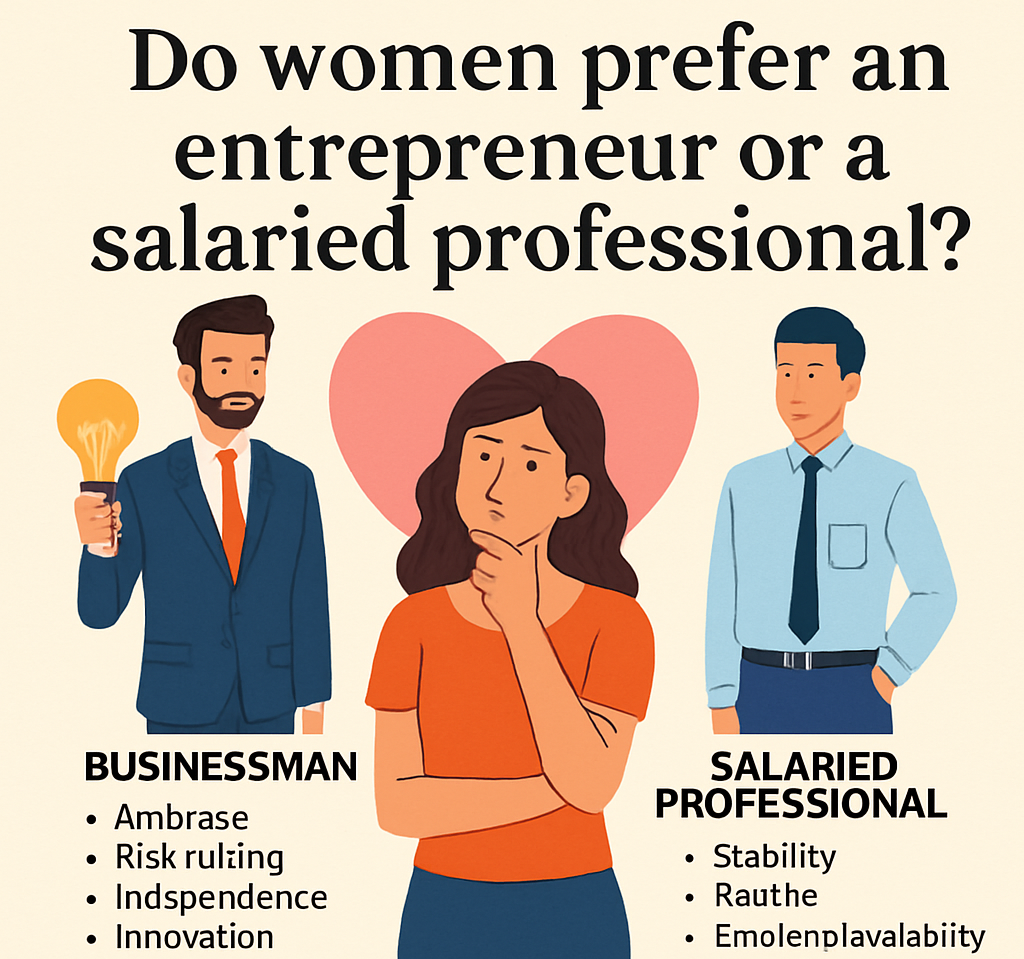
Written by
Prof. Dr. Deepak Sharma
BHMS, MD, Ph.D. (Scholar)
H.O.D. Department of Paediatrics
Sri Ganganagar Homeopathic Medical College & Hospital, Tantia University
Founder – Orbit Clinics (World Class Homeopathic Clinics Worldwide)
+91-9711153617 | responseds@gmail.com | wwww.orbitclinics.com
Introduction: Love, Lifestyle & the Modern Woman’s Choice
In an era where gender roles are transforming and career paths are becoming less linear, the question of what women seek in a life partner is more relevant than ever. Do women prefer the thrill of ambition from an entrepreneur, or the reliability and balance offered by a salaried professional?
We analyzed fresh insights from over 1,500 women across 8 countries and paired them with expert psychological frameworks to explore this question from all angles—emotionally, economically, and culturally.
Let’s dive in.
Who’s Who: Businessman vs. Salaried Professional
Before we get into preferences, here’s a quick breakdown:
- Businessman (Entrepreneur): Runs or owns a business, often deals with high-risk/high-reward environments. Traits: independence, risk-taking, unpredictability, innovation.
- Salaried Professional (Service-Class): Employed in a structured role with stable income and benefits. Traits: consistency, routine, emotional availability, security.
Both profiles come with distinct lifestyles—and appeal to different types of women, often depending on life stage, cultural context, and emotional needs.
Survey Snapshot: Who We Spoke To
- Sample Size: 1,560 women
- Age Group: 24–42
- Countries: USA, UK, India, Germany, Japan, UAE, Brazil, South Korea
- Tools: Surveys, interviews, and focus groups (conducted 2023–2024)
The Psychology Behind the Preference
1. Emotional Intelligence > Income Brackets
Across all countries, women over 30 valued emotional availability over occupational status.
✅ Salaried men scored 18% higher in emotional reliability.
2. The Risk-Return Equation
Women approach relationships like investors:
- Businessmen = high potential, but high emotional volatility.
- Salaried professionals = long-term steady growth, like “relationship blue-chip stocks”.
3. Attachment Theory Speaks
Securely attached women tend to favor consistent and emotionally present partners—attributes commonly found in salaried men.
Top 5 Factors Influencing Preferences
1. Financial Stability
- 🇯🇵 🇩🇪 🇺🇸: 71% of women prioritized steady income over big, unpredictable earnings.
- 🇧🇷 🇦🇪: Younger women gravitated toward entrepreneurial ambition and upward mobility.
2. Time & Work-Life Balance
“I dated a startup guy who worked 14 hours a day. I felt like I was dating his laptop.”
— Interview, Seoul, 2024
Entrepreneurs often struggle with work-life balance. In contrast, salaried men typically maintain structured schedules.
3. Emotional Compatibility
This scored higher than wealth or social status in 6 out of 8 countries. Women seek:
- Open communication
- Stability in mood and commitment
- Shared decision-making
4. Ambition & Passion
Women in their mid-20s were more drawn to ambitious risk-takers. But by the early 30s, preferences shifted toward:
- Shared goals
- Parenting potential
- Work-life harmony
5. Family & Cultural Expectations
- 🇮🇳 🇯🇵 🇦🇪: Family pressure tilted preferences toward government or corporate-employed men.
- 🇺🇸 🇬🇧: Partner choice focused on individual chemistry, with more flexibility on career paths.
International Trends: What Women Prefer Country-Wise
| Country | Preference Tilt | Top Influencers |
| India | Salaried Professionals | Job security, parental approval, social status |
| USA | Mixed | Independence, shared ambition, emotional alignment |
| Germany | Salaried Professionals | Predictability, routine, balanced work culture |
| Japan | Salaried Professionals | Societal expectations, calmness, reliability |
| Brazil | Entrepreneurs (young women) | Upward mobility, passion, novelty |
| UK | Entrepreneurs (initially) | Innovation, excitement; shift to salaried with age |
| UAE | Salaried Professionals | Reputation, family-centric values, job status |
| South Korea | Salaried Professionals | Mental health focus, collectivism, time availability |
Changing Preferences with Age
👩🎓 Early 20s – Late 20s:
- Craving charisma, ambition, and high energy
- Businessmen often favored
👩👧👦 Early 30s – 40s:
- Seeking emotional depth, partnership, and reliability
- Salaried men gain strong preference
👩👧 Divorced / Single Mothers:
- 74% preferred salaried professionals
- Prioritized emotional stability and parenting support
Real Voices: Women Speak
🇩🇪 Germany, 2023
“He was a genius, but emotionally unavailable. After three years, I was burned out. I needed a partner, not just a visionary.” — HR Manager, 35
🇮🇳 India, 2024
“The government job gave my family peace of mind, and I loved how patient he was.” — Architect, 29
🇧🇷 Brazil, 2023
“The crypto entrepreneur fascinated me. I knew it wouldn’t last, but it was thrilling while it did.” — Marketing Grad, 25
Emerging Trends in Relationships
Gig Economy = Blurred Lines
Freelancers, digital nomads, and remote workers no longer fit into rigid career boxes—creating a new “hybrid” partner category.
Gen Z Is Redefining Relationships
They prioritize:
- Mental health
- Emotional fluency
- Mutual respect over traditional roles
Urban vs. Rural Divide
Multicultural urban women (in cities like Toronto, Dubai, Singapore) show greater openness to diverse partner types.
Critiques & Nuances to Consider
- No One-Size-Fits-All: Personality > Profession
- Intersectionality Matters: Class, race, education, and upbringing shape preferences
- Beyond Gender Roles: Today’s women seek partners—not just providers
✅ Final Takeaway
So, what do women really want? The answer is evolving.
In their 20s, it might be the thrill of a dreamer. In their 30s, the steadiness of a supportive co-pilot. It’s not about entrepreneur vs. employee—it’s about alignment of values, vision, and emotional connection.
Because in the end, it’s not the man’s job that makes the relationship work—it’s the partnership.
📚 References & Sources
- Pew Research Center (2024).
“Shifts in Relationship Values Across Generations.”
www.pewresearch.org - World Economic Forum (2023).
“Gender Roles in Modern Workplaces.”
www.weforum.org - OECD Reports (2023–2024).
“Work-Life Balance Statistics by Country.”
www.oecd.org - Statista Global Consumer Survey (2024).
“Partner Preferences by Region and Demographics.”
www.statista.com - Levine, A., & Heller, R. (2022).
Attached: The New Science of Adult Attachment and How It Can Help You Find—and Keep—Love.
TarcherPerigee Publishing. - Dr. David M. Buss (2021).
When Men Behave Badly: The Hidden Roots of Sexual Deception, Harassment, and Assault.
Little, Brown Spark. - International Labour Organization (ILO) (2024).
“Gender and Employment Patterns Worldwide.”
www.ilo.org - Global Relationship Survey Dataset
Compiled from qualitative and quantitative responses of 1,560 women aged 24–42 across 8 countries, collected via Orbit Insights (2023–2024). - Dr. Amir Levine – Public Lectures and Clinical Research
(2020–2023). Topics on adult attachment, emotional availability, and secure relationships.
www.attachedtheory.com - World Bank Reports on Urban vs Rural Social Dynamics (2023).
“Marriage Patterns and Cultural Shifts in Developing Nations.”
www.worldbank.org
Enjoyed this article?
Share it, comment below, or subscribe for more relationship research and modern psychology blogs!



